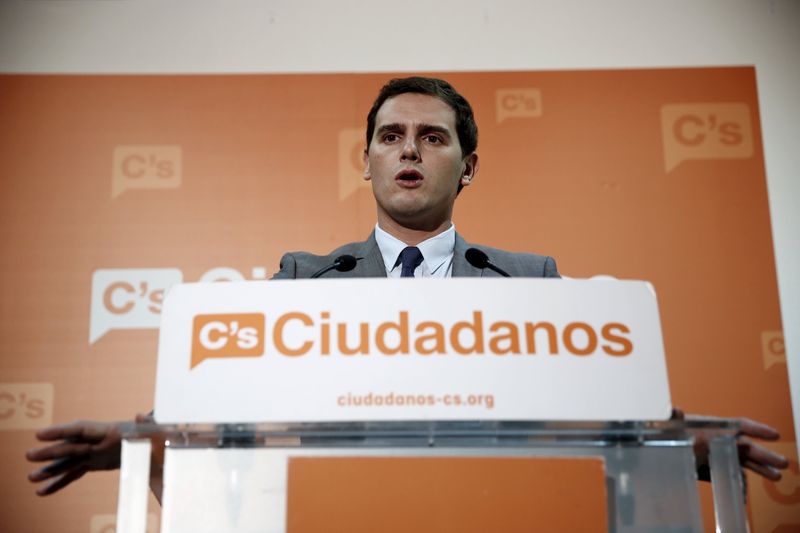MADRID (Reuters) - Spain's ruling People's Party (PP) held on to its lead in an opinion poll three weeks before a national election but new party Ciudadanos overtook the Socialists (PSOE) to move into second place.
The latest poll was published in El Mundo newspaper on Monday ahead of the first live debate by leading candidates.
Prime Minister Mariano Rajoy has declined to participate in the debate, however, leaving the stage to three other leaders - the Socialists' Pedro Sanchez, Ciudadanos' Albert Rivera and left-wing Podemos' Pablo Iglesias.
Rajoy, who has been criticised for not joining the El Pais-sponsored event, will instead take part in a television interview at exactly the same time of 2000 GMT on Monday night.
El Pais declined the prime minister's offer to send his deputy Soraya Saenz de Santamaria to fill his shoes during the online discussion. Official election campaigning for the Dec. 20 election begins on Friday.
Spain's traditional main two parties, the Socialists and the PP, have seen their support fall after years of soaring unemployment and corruption scandals.
The electorate is turning to new alternatives, including Ciudadanos, which is business friendly though liberal on social issues, and Podemos, whose anti-austerity stance struck a chord as Spain struggled through recession.
The El Mundo poll, conducted by Sigma Dos, showed the PP would still win 27.1 percent of the vote while Ciudadanos, whose campaign carried an anti-corruption message, would come second with 23 percent.
The poll, conducted from Nov. 24-26 between 1,500 voters, comes a day after a Metroscopia poll in El Pais showed a three-way tie between the PP, PSOE and Ciudadanos.
According to the Sigma Dos poll, the PSOE would win 20.2 percent of the vote followed by Podemos with 16.2 percent.
Such a result would leave the PP in need a partner to gain a majority in parliament, with Cuidadanos the obvious candidate.
That would break the mould of recent Spanish politics, which has been dominated by the PP and the Socialists since the end of the Franco dictatorship and the restoration of democracy in the mid-1970s.
Spain, which as the European Union's fifth-largest economy, has just emerged from a seven-year financial crisis and Rajoy is hoping the PP will get the credit for the turnaround despite the imposition of tough austerity measures. The party has however been tarnished by a slew of corruption scandals.
Separately, a survey in the Barcelona-based newspaper La Vanguardia showed four parties in a near-tie in Catalonia, where separatist parties are making a push for a break with Spain.
Ciutadans, the Catalan wing of Ciudadanos, took 17.7 percent, while the pro-independence ERC and DiL would win 17.4 percent and 16 percent respectively. The Socialist PSC would take 16.5 percent of the vote.
The Feedback poll was conducted from Nov. 20-27 among 1,000 people in the region.

Spain's largest opinion poll, conducted by the state and considered to be the most reliable, is due for publication on Thursday after the last one showed the PP set to win the election though in need of a partner to rule in parliament.